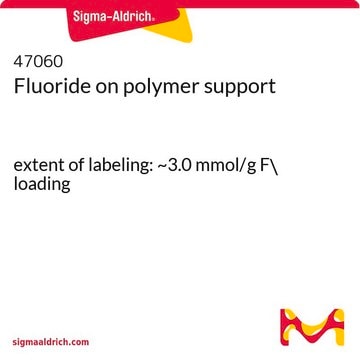241512
Tetrabutylammonium fluoride hydrate
98%
Synonym(s):
TBAF
Sign Into View Organizational & Contract Pricing
All Photos(3)
About This Item
Linear Formula:
[CH3(CH2)3]4NF·xH2O
CAS Number:
Molecular Weight:
261.46 (anhydrous basis)
MDL number:
UNSPSC Code:
12352116
PubChem Substance ID:
NACRES:
NA.22
Recommended Products
Assay
98%
form
solid
mp
62-63 °C (lit.)
SMILES string
O.[F-].CCCC[N+](CCCC)(CCCC)CCCC
InChI
1S/C16H36N.FH.H2O/c1-5-9-13-17(14-10-6-2,15-11-7-3)16-12-8-4;;/h5-16H2,1-4H3;1H;1H2/q+1;;/p-1
InChI key
UQCWXKSHRQJGPH-UHFFFAOYSA-M
General description
Tetrabutylammonium fluoride hydrate is known to be a source of F− anion, used in nucleophilic fluorination reactions.
Application
Reactant for preparation of:
- Double clathrate hydrates at high pressures
- Cellulose ethers
- Terminal olefins via dehydrohalogenation reactions
- Neutral and zwitterionic 3-carboranyl thymidine analogues for boron neutron capture therapy
Tetrabutylammonium fluoride hydrate can be used:
- To prepare 2,7-diethynyl-9-propyl-9H-carbazole, which is a key intermediate for the synthesis of calix[4]arene−carbazole polymers.
- As an anion source in the study of selective detection of F− by anion receptor viz Schiff base.
- To prepare terminal olefins from primary alkyl iodides
Signal Word
Danger
Hazard Statements
Precautionary Statements
Hazard Classifications
Eye Dam. 1 - Skin Corr. 1B
Storage Class Code
8A - Combustible corrosive hazardous materials
WGK
WGK 3
Flash Point(F)
Not applicable
Flash Point(C)
Not applicable
Personal Protective Equipment
dust mask type N95 (US), Eyeshields, Gloves
Certificates of Analysis (COA)
Search for Certificates of Analysis (COA) by entering the products Lot/Batch Number. Lot and Batch Numbers can be found on a product’s label following the words ‘Lot’ or ‘Batch’.
Already Own This Product?
Find documentation for the products that you have recently purchased in the Document Library.
Customers Also Viewed
Hydrated tetrabutylammonium fluoride as a powerful nucleophilic fluorinating agent
Albanese D, et al.
The Journal of Organic Chemistry, 63(25), 9587-9589 (1998)
Naked-eye detection of F- and AcO- ions by Schiff base receptor
Dalapati S, et al.
Journal of Fluorine Chemistry, 132(8), 536-540 (2011)
Sara Lee et al.
Pharmaceutics, 12(6) (2020-06-18)
In cancer nanomedicine, numerous studies have been conducted on the surface modification and transport capacity of nanoparticles (NPs); however, biological barriers, such as enzymatic degradation or non-specific delivery during circulation, remain to be cleared. Herein, we developed pH-sensitive NPs that
Calix [4] arene-carbazole-containing polymers: Synthesis and properties
Barata PD, et al.
Reactive and Functional Polymers, 72(9), 627-634 (2012)
Synthesis, 3085-3085 (2006)
Our team of scientists has experience in all areas of research including Life Science, Material Science, Chemical Synthesis, Chromatography, Analytical and many others.
Contact Technical Service









